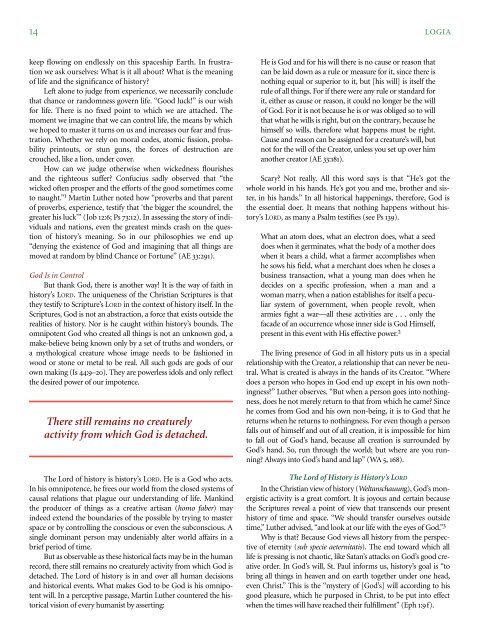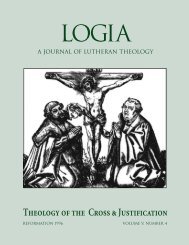04-2 Hermeneutics.pdf
04-2 Hermeneutics.pdf
04-2 Hermeneutics.pdf
- No tags were found...
Create successful ePaper yourself
Turn your PDF publications into a flip-book with our unique Google optimized e-Paper software.
14 LOGIAkeep flowing on endlessly on this spaceship Earth. In frustrationwe ask ourselves: What is it all about? What is the meaningof life and the significance of history?Left alone to judge from experience, we necessarily concludethat chance or randomness govern life. “Good luck!” is our wishfor life. There is no fixed point to which we are attached. Themoment we imagine that we can control life, the means by whichwe hoped to master it turns on us and increases our fear and frustration.Whether we rely on moral codes, atomic fission, probabilityprintouts, or stun guns, the forces of destruction arecrouched, like a lion, under cover.How can we judge otherwise when wickedness flourishesand the righteous suffer? Confucius sadly observed that “thewicked often prosper and the efforts of the good sometimes cometo naught.” 1 Martin Luther noted how “proverbs and that parentof proverbs, experience, testify that ‘the bigger the scoundrel, thegreater his luck’” (Job 12:6; Ps 73:12). In assessing the story of individualsand nations, even the greatest minds crash on the questionof history’s meaning. So in our philosophies we end up“denying the existence of God and imagining that all things aremoved at random by blind Chance or Fortune” (AE 33:291).God Is in ControlBut thank God, there is another way! It is the way of faith inhistory’s LORD. The uniqueness of the Christian Scriptures is thatthey testify to Scripture’s LORD in the context of history itself. In theScriptures, God is not an abstraction, a force that exists outside therealities of history. Nor is he caught within history’s bounds. Theomnipotent God who created all things is not an unknown god, amake-believe being known only by a set of truths and wonders, ora mythological creature whose image needs to be fashioned inwood or stone or metal to be real. All such gods are gods of ourown making (Is 44:9–20). They are powerless idols and only reflectthe desired power of our impotence.There still remains no creaturelyactivity from which God is detached.nbThe Lord of history is history’s LORD. He is a God who acts.In his omnipotence, he frees our world from the closed systems ofcausal relations that plague our understanding of life. Mankindthe producer of things as a creative artisan (homo faber) mayindeed extend the boundaries of the possible by trying to masterspace or by controlling the conscious or even the subconscious. Asingle dominant person may undeniably alter world affairs in abrief period of time.But as observable as these historical facts may be in the humanrecord, there still remains no creaturely activity from which God isdetached. The Lord of history is in and over all human decisionsand historical events. What makes God to be God is his omnipotentwill. In a perceptive passage, Martin Luther countered the historicalvision of every humanist by asserting:He is God and for his will there is no cause or reason thatcan be laid down as a rule or measure for it, since there isnothing equal or superior to it, but [his will] is itself therule of all things. For if there were any rule or standard forit, either as cause or reason, it could no longer be the willof God. For it is not because he is or was obliged so to willthat what he wills is right, but on the contrary, because hehimself so wills, therefore what happens must be right.Cause and reason can be assigned for a creature’s will, butnot for the will of the Creator, unless you set up over himanother creator (AE 33:181).Scary? Not really. All this word says is that “He’s got thewhole world in his hands. He’s got you and me, brother and sister,in his hands.” In all historical happenings, therefore, God isthe essential doer. It means that nothing happens without history’sLORD, as many a Psalm testifies (see Ps 139).What an atom does, what an electron does, what a seeddoes when it germinates, what the body of a mother doeswhen it bears a child, what a farmer accomplishes whenhe sows his field, what a merchant does when he closes abusiness transaction, what a young man does when hedecides on a specific profession, when a man and awoman marry, when a nation establishes for itself a peculiarsystem of government, when people revolt, whenarmies fight a war—all these activities are . . . only thefacade of an occurrence whose inner side is God Himself,present in this event with His effective power. 2The living presence of God in all history puts us in a specialrelationship with the Creator, a relationship that can never be neutral.What is created is always in the hands of its Creator. “Wheredoes a person who hopes in God end up except in his own nothingness?”Luther observes. “But when a person goes into nothingness,does he not merely return to that from which he came? Sincehe comes from God and his own non-being, it is to God that hereturns when he returns to nothingness. For even though a personfalls out of himself and out of all creation, it is impossible for himto fall out of God’s hand, because all creation is surrounded byGod’s hand. So, run through the world; but where are you running?Always into God’s hand and lap” (WA 5, 168).The Lord of History is History’s LORDIn the Christian view of history (Weltanschauung), God’s monergisticactivity is a great comfort. It is joyous and certain becausethe Scriptures reveal a point of view that transcends our presenthistory of time and space. “We should transfer ourselves outsidetime,” Luther advised, “and look at our life with the eyes of God.” 3Why is that? Because God views all history from the perspectiveof eternity (sub specie aeternitatis). The end toward which alllife is pressing is not chaotic, like Satan’s attacks on God’s good creativeorder. In God’s will, St. Paul informs us, history’s goal is “tobring all things in heaven and on earth together under one head,even Christ.” This is the “mystery of [God’s] will according to hisgood pleasure, which he purposed in Christ, to be put into effectwhen the times will have reached their fulfillment” (Eph 1:9f).
















